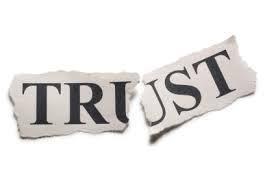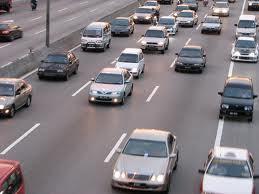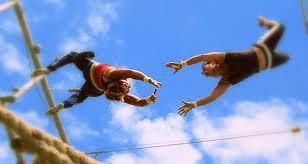A recent Associated Press-GfK poll finds declining levels of trust among Americans. Lost faith in institutions, like government, or churches, might be no surprise. But we’re also losing faith in each other. Only a third now say most people can be trusted, down from half in 1972.  But are we becoming less trustworthy – or is it just that more of us believe so? Yet this can become a self-fulfilling prophecy if we relate to others with increasing distrust and circumspection. The AP report said “social trust” brings benefits: people more willing to compromise, make deals, and work together; whereas distrust diverts energies and encourages corruption. So trust boosts the economy. Indeed, a generally high level of interpersonal trust is one of humanity’s “killer apps,” enabling our species to develop our uniquely elaborate social structures. A good illustration is auto travel.
But are we becoming less trustworthy – or is it just that more of us believe so? Yet this can become a self-fulfilling prophecy if we relate to others with increasing distrust and circumspection. The AP report said “social trust” brings benefits: people more willing to compromise, make deals, and work together; whereas distrust diverts energies and encourages corruption. So trust boosts the economy. Indeed, a generally high level of interpersonal trust is one of humanity’s “killer apps,” enabling our species to develop our uniquely elaborate social structures. A good illustration is auto travel.  It couldn’t work if we didn’t all observe the rules of the road – and trust that everyone else will too. (Or practically everyone.) I don’t perceive the trustworthiness of the average person as declining. Sure, some are always eager to take advantage of others (the “free rider” problem in academic discourse); but that’s a small minority. A key curb on such behavior is that it doesn’t usually occur in a vacuum; people generally foresee future interactions, wherein their past conduct will be taken into account. In my own little coin business, I send almost all orders in advance of payment, even to people I don’t know.
It couldn’t work if we didn’t all observe the rules of the road – and trust that everyone else will too. (Or practically everyone.) I don’t perceive the trustworthiness of the average person as declining. Sure, some are always eager to take advantage of others (the “free rider” problem in academic discourse); but that’s a small minority. A key curb on such behavior is that it doesn’t usually occur in a vacuum; people generally foresee future interactions, wherein their past conduct will be taken into account. In my own little coin business, I send almost all orders in advance of payment, even to people I don’t know.  The nonpayment rate is negligible. Of course, if they hope to order again, they’ll pay. A further incentive is the “deadbeat list” publicized on my website. Such shaming is actually a very ancient method for deterring cheaters. Interestingly, I got an e-mail recently from a guy in Tanzania I’d never heard of, selling coins. He was smart enough to realize Western buyers probably wouldn’t trust an unknown African; but also that they probably could be trusted. So he too offered sending merchandise before payment. I ordered; he sent it; I paid. This is in fact how most of the world’s commerce takes place. Without somebody trusting somebody, elaborate and cumbersome safeguards would be needed, inhibiting trade, to everyone’s loss. I’ve written before how China differs here, its pervasive societal norm being deceit and corruption. If the AP’s survey questions were asked in China, they’d reveal far lower levels of trust than in the West. A reading of Chinese history shows that this factor has, in past epochs, held the country back. More recently China has advanced greatly in spite of it; but this is still a fundamental handicap that cannot but limit the nation’s progress, if they don’t learn to be more transparent, trustworthy, and trusting. (Note to leadership: in traditional Communist party style you can call these “the three tr’s.”) Getting back to America, why has trust declined? The AP report quotes some professor blaming economic inequality – “more Americans feel shut out,” and have “lost their sense of a shared fate.” This says more about the professor than about trust, reflecting an obsession with inequality and imputing a resentment most Americans in fact do not feel (even if politicized lefties believe they should). No – this is not about politics, or economics, this is sociology. As the AP story also does suggest, it has a lot more to do with the “Bowling Alone” phenomenon (from the title of Robert Putnam’s landmark book).
The nonpayment rate is negligible. Of course, if they hope to order again, they’ll pay. A further incentive is the “deadbeat list” publicized on my website. Such shaming is actually a very ancient method for deterring cheaters. Interestingly, I got an e-mail recently from a guy in Tanzania I’d never heard of, selling coins. He was smart enough to realize Western buyers probably wouldn’t trust an unknown African; but also that they probably could be trusted. So he too offered sending merchandise before payment. I ordered; he sent it; I paid. This is in fact how most of the world’s commerce takes place. Without somebody trusting somebody, elaborate and cumbersome safeguards would be needed, inhibiting trade, to everyone’s loss. I’ve written before how China differs here, its pervasive societal norm being deceit and corruption. If the AP’s survey questions were asked in China, they’d reveal far lower levels of trust than in the West. A reading of Chinese history shows that this factor has, in past epochs, held the country back. More recently China has advanced greatly in spite of it; but this is still a fundamental handicap that cannot but limit the nation’s progress, if they don’t learn to be more transparent, trustworthy, and trusting. (Note to leadership: in traditional Communist party style you can call these “the three tr’s.”) Getting back to America, why has trust declined? The AP report quotes some professor blaming economic inequality – “more Americans feel shut out,” and have “lost their sense of a shared fate.” This says more about the professor than about trust, reflecting an obsession with inequality and imputing a resentment most Americans in fact do not feel (even if politicized lefties believe they should). No – this is not about politics, or economics, this is sociology. As the AP story also does suggest, it has a lot more to do with the “Bowling Alone” phenomenon (from the title of Robert Putnam’s landmark book).  Quite simply, we spend less time actually interacting with other people. I’m not one of those who laments modernity as pathology; its benefits are worth the costs; but one of those costs seems to be reduced face-to-face social intercourse. That impedes building a body of experience validating an assumption of trustworthiness; while perceptions get skewed in the opposite direction by increased exposure, from ubiquitous media, to the underside of human conduct. It’s a cliché that an air crash makes the news but thousands of safe landings do not. Similarly, we are relentlessly informed about people behaving badly while the vastly commoner examples of decent behavior become invisible. I send coin orders before payment because, having done it thousands of times, I know to a fare-thee-well what the payment rate is.
Quite simply, we spend less time actually interacting with other people. I’m not one of those who laments modernity as pathology; its benefits are worth the costs; but one of those costs seems to be reduced face-to-face social intercourse. That impedes building a body of experience validating an assumption of trustworthiness; while perceptions get skewed in the opposite direction by increased exposure, from ubiquitous media, to the underside of human conduct. It’s a cliché that an air crash makes the news but thousands of safe landings do not. Similarly, we are relentlessly informed about people behaving badly while the vastly commoner examples of decent behavior become invisible. I send coin orders before payment because, having done it thousands of times, I know to a fare-thee-well what the payment rate is.  But few people nowadays get the benefit of comparable experience with human trustworthiness.
But few people nowadays get the benefit of comparable experience with human trustworthiness.
